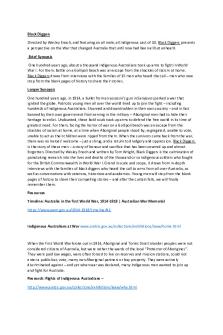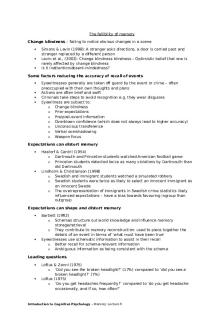Idea of hope essay for Black Diggers and the Longest Memory PDF

| Title | Idea of hope essay for Black Diggers and the Longest Memory |
|---|---|
| Course | English |
| Institution | Victorian Certificate of Education |
| Pages | 2 |
| File Size | 63.7 KB |
| File Type | |
| Total Downloads | 5 |
| Total Views | 131 |
Summary
Idea of hope essay for Black Diggers and the Longest Memory ...
Description
Compare how the two texts explore the idea of hope Fred D’Aguiar’s novella, The Longest Memory, recounts an African American slave’s endurance through pre-civil war Virginia whilst experiencing great adversity and discrimination as time progresses. Tom Wright’s play, Black Diggers, explores the journeys of various Indigenous Australian men throughout World War 1 and the subsequent racial prejudice involved. Throughout both texts, the concept of hope is explored as being present when communities align their beliefs whilst hope eliminates itself through actions of violence and prejudice. The evident lack of Hope instilled in a variety of character’s mindsets is debilitating to those involved whilst a loss of hope is elucidated when marginalised characters are taken advantage of. Moreover, a return of this lost hope is established through the integration of communities and societies. The pervasive lack of hope embodied by those mistreated is heightened through their pessimistic mindsets and total absence of optimism. Through including the perspectives of multiple characters, specifically those of Mr. Whitechapel and Lydia, D’Aguiar highlights how those in the majority have no distinct hope for those seen as minorities. As Mr. Whitechapel identifies that ‘teaching little Whitechapel to read and write’ was primarily an ‘injustice’, this ingrained inferiority and lack of hope for the prosperity of Chapel is promoted. Furthermore, Whitechapel's personal lack of hope is made clear in identifying himself as a ‘boy, mule, … slave or whatever…anyone chose’. D’Aguiar demonstrates that Whitechapel’s absence of hope not only removes himself of an identity but rather alleviates himself of any self-worth. Whilst D’Aguiar presents this lack of hope through the dichotomy of those seen as superior and those seen as inferior, Wright depicts this through the implicit and undercover institutionalised racism experienced by Indigenous men. Harry's battalion is seemingly unaware of the inequality that is wedged between their conflicting races, so much so that Harry feels it necessary to explain that if the white soldiers ‘have a beer with’ him, that will be a feat of its own. In doing so, Wright draws attention to the societal attitudes of the Indigenous men and their distinct lack of hope for a united future. Moreover, Wright repeatedly stresses this concept that those in the majority are unaware of the discrimination faced by those in the minority in employing Mick’s dialogue at the Soldier Settlement Convention. Mick speaks to the officials in charge and explains that the ‘war’s over’ for the white soldiers but is ‘never going to end’ for the Indigenous men, highlighting not only his pessimistic mindset towards the prospect of racial integration but also his personal lack of hope. Ultimately, this absence of hope is ingrained in the minds of those seen as superior and inferior and is only escalated as time progresses. The loss of hope is explored as a result of the oppression and violence experienced by those involved. D’Aguiar depicts Whitechapel's loss of hope as being a result of Chapel’s death. As Whitechapel recalls that ‘the whip ate into’ Chapel, D’Aguiar’s use of a melancholy tone demonstrates this ultimate loss of hope in Whitechapel. Similarly, Sanders Senior inflicts a loss of hope in Sanders Junior when teaching him that those of European descent ‘are different from slaves in intelligence and human standing’. In doing so, Sanders Junior’s potential initial hope for those enslaved is terminated and replaced with overwhelming feelings of superiority. In a similar fashion, Black Diggers explores this surrender of hope through the oppression and violence driving the discriminatory mindsets of those perpetuating these injustices. Wright depicts Bertie’s grandfather’s loss of hope for the unity
of his country after enduring great marginalisation and exclusion throughout his life. The irony and cynicism behind his explanation that he has ‘never heard of’ Australia demonstrates Bertie’s grandfather’s evident loss of hope for a united forefront. Moreover, Wright employs the character of a German prison guard to explicitly outline the reasons for this loss of hope in Nigel. In speaking of ‘oppressive masters’, ‘seized…lands’ and ‘shackles of…British masters’, the brutal treatment endured is indicative of the pervasive lack of hope in solders. Through the unjust behaviour towards and the treatment of both slaves and Indigenous soldiers, the loss of hope within minorities is not only explored but justified. Despite a clear lack and loss of hope within a variety of characters, an evident return of hope is demonstrated when communities align their values and beliefs. D’Aguiar utilises the character of Mr. Whitechapel to display a contrary view towards those enslaved exemplifying the concept of hope being found through aligning his views with Whitechapel’s. He explores the idea that although ‘Africans may be [his] inferiors’, they still possess ‘the same qualities’ that he does, this underlying mutual respect further alludes to this return of hope for the slaves living on his plantation. Moreover, Mr. Whitechapel exhibits a similar approach in attempt to unify the discriminatory divide in stating that despite slaves being inferior, ‘they [are] people’ like himself. Through this, D’Aguiar promotes the concept of hope as being regained through Mr. Whitechapel’s attempt of minimising the dehumanisation of slaves. Similarly, Black Diggers depicts this instigation of hope through the members of the majority in positions of authority. Whilst out with his battalion, a ‘white solder’ tells Harry that he is ‘as good as a white man’. In doing so, Wright highlights how the community aids in bringing hope to those marginalised when common ground, such as the war, is found. Furthermore, Wright’s use of the RSL secretary character is pivotal in further demonstrating the union of the community bringing hope to those involved. He dismisses what the racist bar-hand claims and instead invites the Indigenous men in explaining he doesn’t ‘see the skin’ instead he ‘see[s] the service’, thereby showcasing this newly found hope due to a mutual align in values. Thus, the integration of communities is critical in providing those in the minority with hope for an amalgamated society. Ultimately, throughout both texts, the concept of hope is malleable and easily manipulated through the actions of those in both the majority and minority. The lack of hope in characters is explored through their poor mindsets as a result of their mistreatment whilst a loss of hope is demonstrated through violent and oppressive treatment and behaviours. Finally, the return and establishment of hope is embodied through communities aligning their beliefs and values, revealing their similarities and common ground....
Similar Free PDFs

Symbols in Black Diggers
- 3 Pages

Black Diggers some resources
- 2 Pages

HOPE - for hope assginemnt
- 2 Pages
Popular Institutions
- Tinajero National High School - Annex
- Politeknik Caltex Riau
- Yokohama City University
- SGT University
- University of Al-Qadisiyah
- Divine Word College of Vigan
- Techniek College Rotterdam
- Universidade de Santiago
- Universiti Teknologi MARA Cawangan Johor Kampus Pasir Gudang
- Poltekkes Kemenkes Yogyakarta
- Baguio City National High School
- Colegio san marcos
- preparatoria uno
- Centro de Bachillerato Tecnológico Industrial y de Servicios No. 107
- Dalian Maritime University
- Quang Trung Secondary School
- Colegio Tecnológico en Informática
- Corporación Regional de Educación Superior
- Grupo CEDVA
- Dar Al Uloom University
- Centro de Estudios Preuniversitarios de la Universidad Nacional de Ingeniería
- 上智大学
- Aakash International School, Nuna Majara
- San Felipe Neri Catholic School
- Kang Chiao International School - New Taipei City
- Misamis Occidental National High School
- Institución Educativa Escuela Normal Juan Ladrilleros
- Kolehiyo ng Pantukan
- Batanes State College
- Instituto Continental
- Sekolah Menengah Kejuruan Kesehatan Kaltara (Tarakan)
- Colegio de La Inmaculada Concepcion - Cebu












